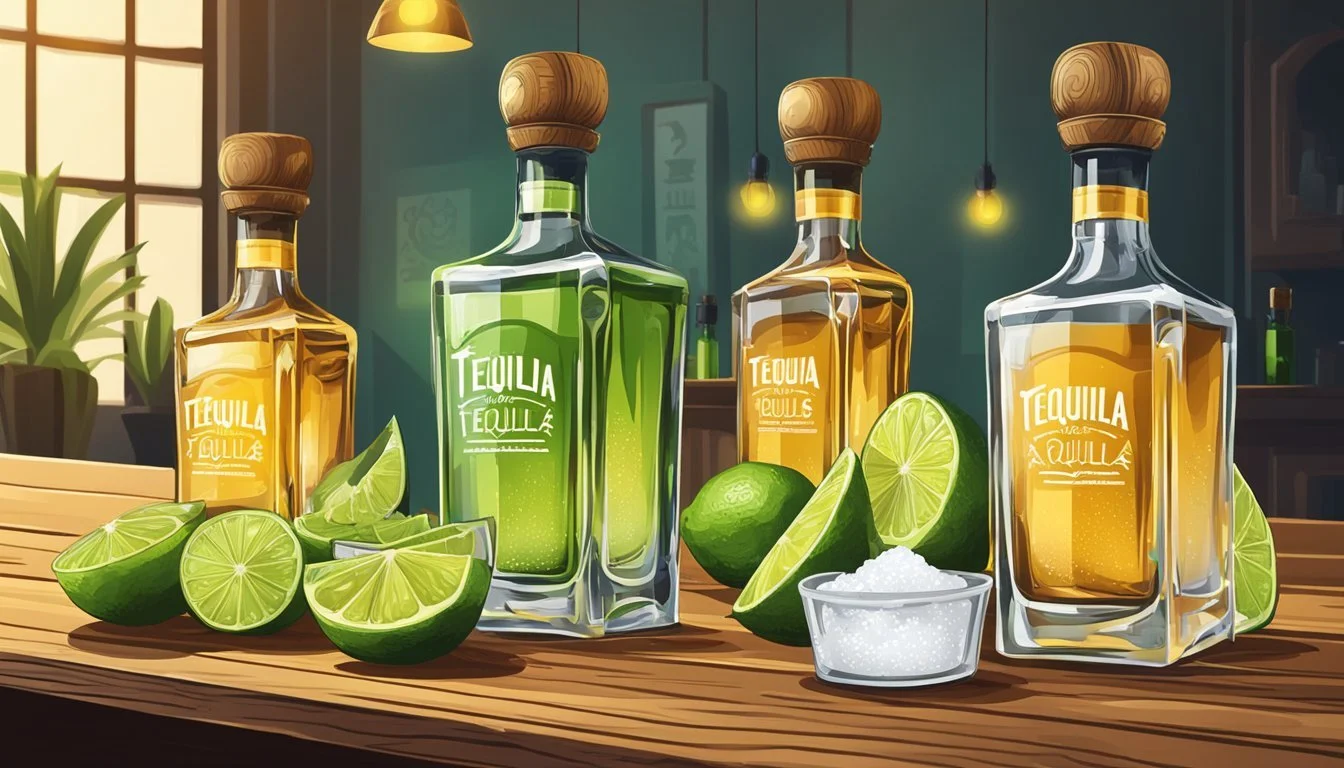Tequila Substitutes
Top Alternatives for Your Cocktails
Tequila is a distinctive spirit renowned for its bold flavor, which comes from the blue agave plant native to Mexico. Its unique taste is a cornerstone in a variety of cocktails and culinary recipes, but there are times when a substitute is necessary. Whether due to unavailability, personal preferences, or the desire for a non-alcoholic option, there are several viable tequila alternatives that can mimic the spirit's character in both taste and aroma.
Non-alcoholic tequila substitutes like Mockingbird Spirit Agave and Ritual Zero Proof offer a similar flavor profile to traditional tequila, often derived from the same agave plants but without the alcohol content. These alternatives have been crafted to provide the same essence in beverages, ensuring that the final product retains the intended nuances. For those seeking an alcohol-based substitute, mezcal stands out as the closest relative to tequila, delivering a smokier undertone while preserving the quintessential agave taste.
In the realm of cooking, ingredients such as chicken broth or white vinegar can be employed to approximate the effect of tequila, each bringing its own qualities to a dish. These tequila substitutes add depth and complexity to various recipes, ensuring that the absence of actual tequila does not compromise the intended flavor profile. With a variety of substitutes available, chefs and mixologists can confidently adapt their creations without sacrificing authenticity.
Understanding Tequila
In this section, we examine tequila in terms of its fundamental characteristics, distinct flavors, and unique production process involving the blue agave plant.
The Basics of Tequila
Tequila is a spirit that originates from Mexico, specifically from the area surrounding the city of Tequila. It is distilled from the juice of the blue agave plant. By Mexican law, tequila can only be produced in certain regions, mainly in the state of Jalisco. There are several types of tequila: Blanco, Joven, Reposado, Añejo, and Extra Añejo, which are differentiated by their aging process.
Flavor Profile of Tequila
The flavor of tequila varies widely but is typically known for its earthy and smoky flavors. Tequila's distinctive taste comes from the blue agave plant, which imparts a natural sweetness and a range of aromas from fresh and herbaceous to deep and woody. The alcohol content, generally around 38% to 55%, contributes to its bold flavor profile.
Blanco: Clear and typically unaged, with the purest taste of agave.
Reposado: Aged between two months and a year, developing a smoother taste.
Añejo: Aged for one to three years, has deeper, richer flavors.
Extra Añejo: Aged for over three years, known for complexity and smoothness.
Tequila Production and the Blue Agave Plant
Tequila is produced through a meticulous process that begins with the blue agave plant. Only the species Agave tequilana Weber blue variety is used for making true tequila. Harvesters, known as jimadores, carefully select and harvest the plant, trimming away the leaves to reveal the core or "piña." The piñas are then cooked to convert their starches into fermentable sugars.
Harvesting: Jimadores select mature agave plants, usually around 5 to 8 years old.
Cooking: Piñas are steam-cooked in ovens called "hornos" or autoclaves.
Fermentation: The cooked agave is mashed, and the extracted juice is fermented.
Distillation: The fermented agave must is twice distilled in pot stills or column stills.
Aging: Some tequilas are aged in oak barrels which impart additional flavors and aromas.
This intricate process ensures that the spirit of tequila, from its tequila taste to tequila cocktails, is revered for its traditional tequila characteristics and distinctive aroma, making it a cherished alcoholic beverage worldwide.
Alcoholic Tequila Alternatives
When seeking an alternative to tequila in cocktails like margaritas, palomas, or tequila sunrises, it is crucial to consider both flavor compatibility and alcohol content. Alternatives within the agave family offer a proximate taste profile, while other spirits can introduce a new dimension to traditional mixed drinks.
Substitutes Within the Agave Family
The closest relative to tequila is mezcal, which shares its agave lineage but introduces a smokier nuance to cocktails. Mezcal can maintain the integrity of a margarita's flavor profile while adding depth. For a paloma or tequila sunrise, which rely on the balance of sweetness and acidity from fruit juices and citrus, mezcal can enhance the drink with its complex notes.
Mezcal:
Flavor: Smokier than tequila, varying levels of sweetness.
Alcohol Content: Comparable to tequila.
Availability: Widely available in areas that sell tequila.
Other Spirits as Substitutes
When mezcal isn't available or a different taste is desired, spirits like rum, vodka, whiskey, and gin can be utilized. While these do not replicate tequila’s flavor, they can craft a unique take on mixed drinks.
Rum: Offers a sweeter note, ideal for punch or mixed drinks requiring added sweetness.
Vodka: A neutral spirit, it provides a clean slate for the other flavors in mixed drinks.
Whiskey: Adds a warm, rich quality, particularly suitable for cocktails with more depth.
Gin: Its botanicals bring a different but refreshing twist to citrus-based mixed drinks.
Substituting spirits requires attention to the mix's overall balance. A substitute spirit may alter the interplay of sweetness, acidity, and flavor, thus requiring adjustments with lime juice, agave nectar, or other components to achieve the desired taste.
Non-Alcoholic Substitutes
For those seeking the essence of tequila without alcohol, non-alcoholic tequila alternatives and common kitchen ingredients offer a versatile solution for crafting mocktails and non-alcoholic beverages.
Non-Alcoholic Spirit Alternatives
Non-alcoholic spirits mimic the complex flavors and aromas of traditional tequila, providing a similar experience without the alcohol. Mockingbird Spirit Agave and Ritual Zero Proof Tequila Alternative are among the popular brands that utilize botanicals to echo the nuances of the agave plant. Lyre’s Agave Blanco is recognized for its accurate flavor profile with undertones of citrus and a hint of heat. Here are some options to consider:
Mockingbird Spirit Agave: A tequila-styled non-alcoholic spirit,
Ritual Zero Proof Tequila Alternative: Offers a taste akin to traditional tequila,
Lyre’s Agave Blanco: Known for its agave-based flavor with notes of lemon and pine,
Seedlip Spice 94: A complex blend of aromatic spices and botanicals,
Seedlip Grove 42: Contains citrus elements like blood orange and mandarin,
Free Spirit "Clean T": A non-alcoholic option with southwestern notes.
These alternatives can be used to prepare various mocktails, like a non-alcoholic margarita, by simply substituting them for traditional tequila in recipes.
Using Common Kitchen Ingredients
When specific alcohol-free tequila substitutes are unavailable, common kitchen ingredients can be creatively used to approximate the flavor profile. Elements like vinegars and sweet syrups are excellent for adding the depth and tang needed for tequila-like mocktails. Here is a list of alternatives and how they can be used:
Vinegars: To provide a sharp taste that emulates tequila's bite,
Apple Cider Vinegar: Adds a fruit-forward tang,
White Vinegar: Offers a clean, sharp acidity,
Balsamic Vinegar: Brings a complex, slightly sweet flavor.
Natural Sweeteners: These add a subtle sweetness, reminiscent of tequila's natural undertones,
Agave Nectar: A sweet syrup from the agave plant,
Honey: A natural sweetener with floral notes.
Other Add-ins: Can be used for layering flavors or adding a burst of freshness,
Vanilla Extract: A small amount adds depth,
Club Soda or Water: Used for diluting and adjusting the strength,
Citrus: Lime or lemon juices or nectars add the necessary zest.
By experimentally mixing these ingredients, enthusiasts can craft a mocktail that draws close to the expected taste of a tequila-based drink. The aim is to balance sharpness and sweetness to create a non-alcoholic concoction that resembles a spirited beverage.
Creative Mixology and Recipes
The absence of tequila doesn't mean the end of delicious cocktails and culinary delights. One can artfully replace tequila with suitable substitutes in mixed drinks and cooking recipes, ensuring a balance of flavors that range from citrusy to spicy.
Crafting Tequila-Free Cocktails
Margaritas can still shine without tequila by using vodka or gin. For instance, a vodka substitute, when combined with herbs, spices, and fruit juices such as lime or grapefruit juice, can give rise to a new taste adventure. To craft a margarita alternative, mix:
2 oz vodka or gin
1 oz fresh lime juice
0.5 oz orange liqueur
0.5 oz simple syrup or tequila-flavored syrup
Shake well with ice and strain into a glass with a salted rim.
For tequila-free mocktails, use sparkling water or soda, paired with a citrus base like lime juice, and add excitement with a dash of jalapeño juice or a sprig of cilantro for complexity.
Cooking and Marinades Without Tequila
In cooking, the umami and zesty character of tequila can be replicated using citrus juices and herbal infusions. For a marinade that usually calls for tequila:
Combine equal parts pineapple juice and lime juice as the acidic base.
Add a touch of sweetness with agave syrup to imitate the sweet notes of tequila.
Introduce spices such as black pepper or a splash of jalapeño juice for a spicy kick.
Use this blend for marinating proteins like chicken or shrimp, and enjoy the layered flavors it creates.
In dressings and sauces, a tequila-flavored syrup can provide the intended flavor profile without the alcohol content, perfectly mixing sweetness and acidity for a balanced taste.
Considerations for Choosing Tequila Substitutes
When selecting a substitute for tequila, individuals should take into account health concerns, the desired flavor profile, and practical considerations such as cost and availability.
Health and Dietary Restrictions
For individuals with allergies or intolerances to ingredients found in tequila, substitutes like lime juice can be a safe alternative. Lime juice provides a citrusy tang without the alcohol content, making it suitable for those avoiding alcohol for health reasons or religious beliefs.
Allergies: Avoid distilled spirits; consider citrus juices.
Intolerance/Health Reasons: Non-alcoholic options like lime juice or vinegar-based mixtures.
Religious Beliefs: Non-alcoholic versions such as mocktail ingredients or agave syrup.
Flavor and Taste Matching
The distinctive taste of tequila is characterized by its agave flavor, and matching this profile is key for a successful replacement. Mezcal offers a similar flavor with a smokier note, while other spirits such as Cachaça provide a different but complementary taste.
Taste Preferences:
Mezcal: Similar to tequila, smokier.
Cachaça: Unique taste; good for cocktails.
Chicken broth: Savory notes for cooking.
Price and Availability
Price and availability may dictate the choice of tequila substitutes. While substitutes like Mezcal can be on the pricier side and are not always available everywhere, other alternatives like rum or chicken broth are usually more readily available and budget-friendly.
Comparative Costs:
Mezcal: Higher price, may be harder to find.
Rum: Generally affordable and widely available.
Chicken broth: Inexpensive and readily available in stores.



